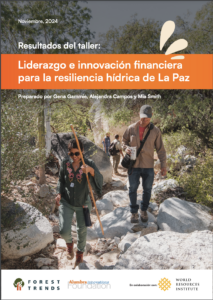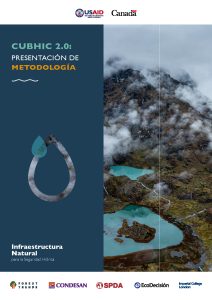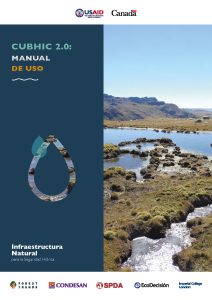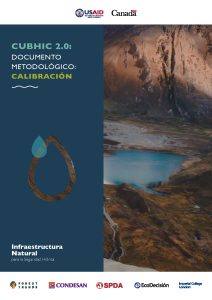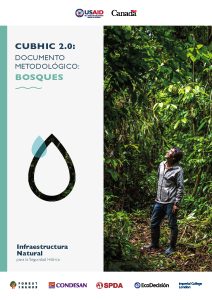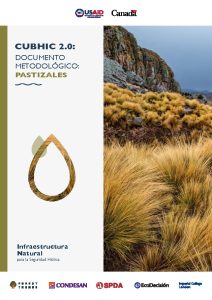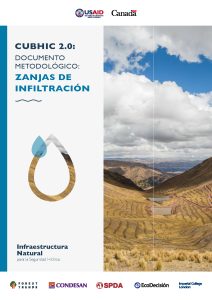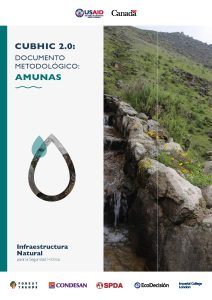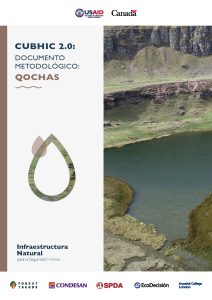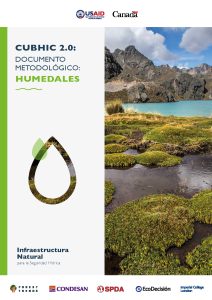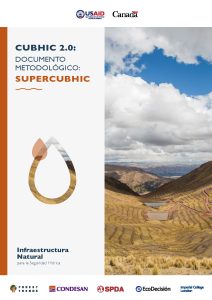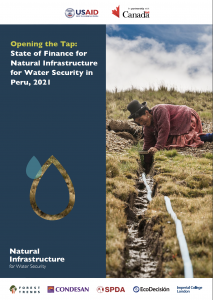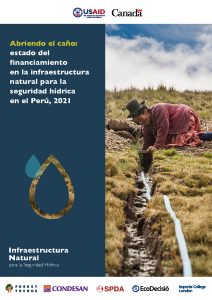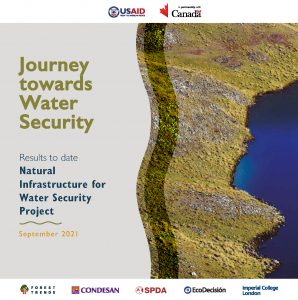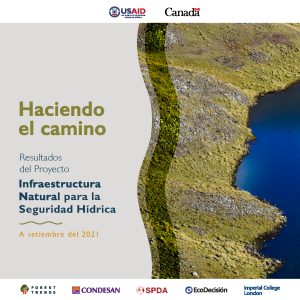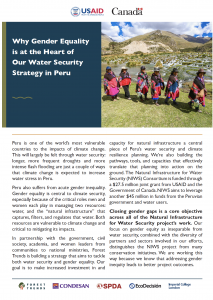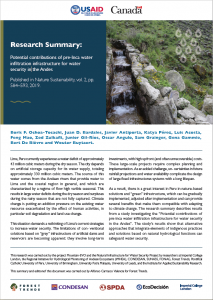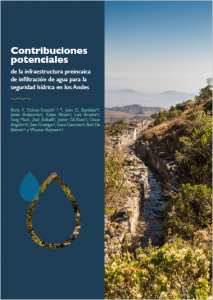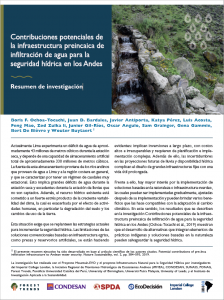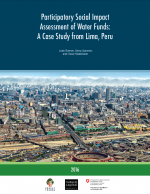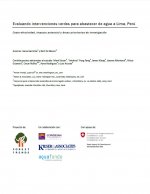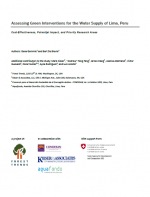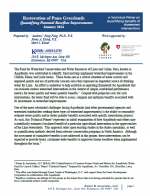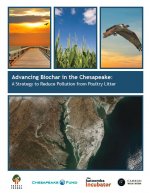Gena Gammie
DirectorWater Initiative

Gena Gammie is the Director of Forest Trends’ Water Initiative, which aims to scale up incentives and other economic tools that recognize the value of nature and upstream communities in assuring secure, safe water. In this role Gena works collaboratively with civil society, government, and professional associations to systematically address barriers to realizing effective watershed investments and leads Forest Trends’ work on analyses and tools for evaluating the cost-effectiveness of green infrastructure, with the aim of promoting performance-based investments in green infrastructure by mainstream water resources managers. Gena brings to this role experience on forest carbon project development and analysis, climate policy analysis with ICLEI-Local Governments for Sustainability, and strategic communication at McKinsey & Company’s Sustainability and Resource Productivity practice. Gena holds an MSc with Distinction in Environmental Policy & Regulation from the London School of Economics, where her dissertation focused on multi-stakeholder platforms for cooperative water resources management.
Resultados del taller: Liderazgo e innovación financiera para la resiliencia hídrica de La Paz
By Gena Gammie, Alejandra Campos y Mia Smith View PublicationLa región de La Paz enfrenta uno de los mayores desafíos hídricos en México. El clima árido y su crecimiento poblacional han provocado la sobreexplotación de los acuíferos, lo que propicia la intrusión de agua salada. Asimismo, cuando ocurren tormentas tropicales y huracanes, la región sufre intensas inundaciones, especialmente en las zonas urbanas. Frente a […]
Metodología de cuantificación de beneficios hidrológicos de intervenciones en cuencas – CUBHIC 2.0
By Boris Ochoa-Tocachi, José Cuadros-Adriazola, Vivien Bonnesoeur, Francisco Román-Dañobeytia, Gena Gammie View PublicationLa cuantificación de beneficios hidrológicos es clave para el diseño y evaluación de proyectos de infraestructura natural para la seguridad hídrica. La metodología CUBHIC (Cuantificación de Beneficios Hidrológicos de Intervenciones en Cuencas) es una innovación del proyecto Infraestructura Natural para la Seguridad Hídrica, que ofrece una metodología práctica para producir estimaciones cuantitativas de los beneficios[…]
Dependent Documents
Manual de Uso – CUBHIC 2.0
By Boris F. Ochoa-Tocachi, José Cuadros-Adriazola, Vivien BonnesoeurDocumento Metológico: Calibración – CUBHIC 2.0
By José Cuadros-Adriazola, Boris F. Ochoa-Tocachi, Vivien BonnesoeurDocumento Metodológico: Bosques – CUBHIC 2.0
By Boris F. Ochoa-Tocachi, José Cuadros-Adriazola, Vivien BonnesoeurDocumento Metodológico: Pastizales – CUBHIC 2.0
By Boris F. Ochoa-Tocachi, José Cuadros-Adriazola, Vivien BonnesoeurDocumento Metodológico: Zanjas – CUBHIC 2.0
By Boris F. Ochoa-Tocachi, José Cuadros-Adriazola, Vivien BonnesoeurDocumento Metodológico: Amunas – CUBHIC 2.0
By Boris F. Ochoa-Tocachi, José Cuadros-Adriazola, Vivien BonnesoeurDocumento Metodológico: Qochas – CUBHIC 2.0
By Boris F. Ochoa-Tocachi, José Cuadros-Adriazola, Vivien BonnesoeurDocumento Metodológico: Humedales – CUBHIC 2.0
By Boris F. Ochoa-Tocachi, José Cuadros-Adriazola, Vivien BonnesoeurDocumento Metodológico: SUPERCUBHIC – CUBHIC 2.0
By Boris F. Ochoa-Tocachi, José Cuadros-Adriazola, Vivien BonnesoeurOpening the Tap: State of Finance for Natural Infrastructure for Water Security in Peru, 2021
By Gena Gammie, Lucas Benites Elorreaga View PublicationIn Peru, policymakers and water managers are increasingly recognizing the indispensable role natural infrastructure and ancestral technology play in managing water risks. As this report shows, investments in the maintenance and restoration of natural infrastructure that play key roles for water security, from forests and grasslands to amunas (pre-Incan canals that support aquifer recharge), are[…]
Abriendo el caño: estado del financiamiento en la infraestructura natural para la seguridad hídrica en el Perú, 2021
By Gena Gammie, Lucas Benites Elorreaga View PublicationEl presente estudio revela que cada vez más autoridades del Estado y gestores del agua en el Perú reconocen el rol indispensable que juega la infraestructura natural y las técnicas ancestrales en la gestión de los riesgos hídricos. Como veremos, el financiamiento en intervenciones que mantienen, recuperan y mejoran la infraestructura natural para la seguridad[…]
Dependent Documents
Opening the Tap: State of Finance for Natural Infrastructure for Water Security in Peru, 2021
By Gena Gammie, Lucas Benites ElorreagaJourney Towards Water Security
Results to date - Natural Infraestructure for Water Security Project, September 2021
By Gena Gammie, Lucas Benítes Elorreaga, Fernando Momiy Hada View PublicationThis report presents the principal results to date of the Natural Infrastructure for Water Security Project (NIWS), which were achieved together with a large group of partners. We recognize and appreciate their collaboration and leadership towards a sustainable future. These results have been achieved despite extraordinarily complex circumstances throughout the Project, during which we have […]
Haciendo el Camino
Resultados del Proyecto Infraestructura Natural para la Seguridad Hídrica a setiembre del 2021
By Gena Gammie, Lucas Benítes Elorreaga, Fernando Momiy Hada View PublicationEste reporte presenta los principales resultados del Proyecto Infraestructura Natural para la Seguridad Hídrica (“el Proyecto INSH”). Los logros son compartidos con un grupo amplio de aliados, a quienes reconocemos y agradecemos profundamente por su colaboración y liderazgo a favor de un futuro sostenible. Los logros que se presentan han sido posibles a pesar de […]
Dependent Documents
Journey Towards Water Security
Results to date - Natural Infraestructure for Water Security Project, September 2021
By Gena Gammie, Lucas Benítes Elorreaga, Fernando Momiy HadaWhy Gender Equality is at the Heart of Our Water Security Strategy in Peru
By Cheyenne Coxon, Genevieve Bennett, and Gena Gammie View PublicationIn partnership with the Peruvian government, civil society, academia, and women leaders from communities to national ministries, Forest Trends is building a strategy that aims to tackle both water security and gender equality. Our goal is to make increased investment in and capacity for natural infrastructure a central piece of Peru’s water security and climate […]
Research Summary: Potential contributions of pre-Inca water infiltration infrastructure for water security in the Andes
By Boris F. Ochoa-Tocachi, Juan D. Bardales, Javier Antiporta, Katya Pérez, Luis Acosta, Feng Mao, Zed Zulkafli, Junior Gil-Ríos, Oscar Angulo, Sam Grainger, Gena Gammie, Bert De Bièvre, and Wouter Buytaert View PublicationThere is great interest in Peru in nature-based solutions and “green” infrastructure, which can be gradually implemented, adjusted after implementation and can provide several benefits that make them compatible with adapting to climate change. This research summary describes results from a study published in Nature Sustainability, “Potential contributions of pre-Inca water infiltration infrastructure for water[…]
Contribuciones potenciales de la infraestructura preincaica de infiltración de agua para la seguridad hídrica en los Andes
By Boris F. Ochoa-Tocachi, Juan D. Bardales, Javier Antiporta, Katya Pérez, Luis Acosta, Feng Mao, Zed Zulkafli, Junior Gil-Ríos, Oscar Angulo, Sam Grainger, Gena Gammie, Bert De Bièvre y Wouter Buytaert View PublicationA nivel mundial, los recursos hídricos están sometidos a un fuerte estrés producto de la creciente variabilidad climática y las presiones ejercidas por el ser humano. En los Andes tropicales, las culturas preincaicas desarrollaron tecnologías de siembra y cosecha de agua basadas en la naturaleza para manejar los riesgos de sequías en climas naturales extremos. […]
Dependent Documents
Resumen de investigación: Contribuciones potenciales de la infraestructura preincaica de infiltración de agua para la seguridad hídrica en los Andes
By Boris F. Ochoa-Tocachi, Juan D. Bardales, Javier Antiporta, Katya Pérez, Luis Acosta, Feng Mao, Zed Zulkafli, Junior Gil-Ríos, Oscar Angulo, Sam Grainger, Gena Gammie, Bert De Bièvre y Wouter BuytaertResearch Summary: Potential contributions of pre-Inca water infiltration infrastructure for water security in the Andes
By Boris F. Ochoa-Tocachi, Juan D. Bardales, Javier Antiporta, Katya Pérez, Luis Acosta, Feng Mao, Zed Zulkafli, Junior Gil-Ríos, Oscar Angulo, Sam Grainger, Gena Gammie, Bert De Bièvre, and Wouter BuytaertResumen de investigación: Contribuciones potenciales de la infraestructura preincaica de infiltración de agua para la seguridad hídrica en los Andes
By Boris F. Ochoa-Tocachi, Juan D. Bardales, Javier Antiporta, Katya Pérez, Luis Acosta, Feng Mao, Zed Zulkafli, Junior Gil-Ríos, Oscar Angulo, Sam Grainger, Gena Gammie, Bert De Bièvre y Wouter Buytaert View PublicationParticipatory Social Impact Assessment of Water Funds
A Case Study from Lima, Peru
By Leah Bremer, Gena Gammie, Oscar Maldonado - Forest Trends, Forest Trends, Forest Trends View PublicationWater users and governments are increasingly recognizing watershed conservation as a critical component of a comprehensive water security strategy. In Latin America, this has inspired the launch of dozens of water funds, which facilitate investments in watershed conservation and restoration by pooling financial contributions from downstream water users, governments, and businesses. Beyond generating hydrological benefits […]
Dependent Documents
Evaluación Participativa del Impacto Social de los Fondos de Agua
By Leah Bremer, Gena Gammie, Oscar Maldonado - Natural Capital Project, Forest TrendsEvaluación Participativa del Impacto Social de los Fondos de Agua
By Leah Bremer, Gena Gammie, Oscar Maldonado - Natural Capital Project, Forest Trends View PublicationEste estudio de caso aborda la necesidad de una orientación práctica para evaluar el impacto social de los fondos de agua al documentar y reflexionar sobre un proceso de evaluación del impacto social dirigido por Aquafondo, el fondo del agua de Lima, Perú.
Evaluando intervenciones verdes para abastecer de agua a Lima, Perú
By Gena Gammie, Bert De Bievre - Forest Trends View PublicationLima, Perú es la segunda ciudad más grande del mundo localizada en el desierto. Se destaca entre las principales ciudades de América Latina y del mundo por afrontar un estrés hídrico que podrá afectar a sus aproximadamente 9 millones de habitantes. El deterioro en la calidad y cantidad del agua amenaza el desarrollo económico de […]
Assessing Green Interventions for the Water Supply of Lima, Peru
Cost-Effectiveness, Potential Impact, and Priority Research Areas
By Gena Gammie (Forest Trends), Bert De Bievre (CONDESAN) View PublicationLima, Peru is the second-largest desert city in the world. It stands out among major cities in Latin America and the world in the severity of the water stress faced by its approximately 9 million residents. Substantial water quality and quantity challenges threaten the continued economic growth of the city and Peru at large. While […]
Dependent Documents
Evaluando intervenciones verdes para abastecer de agua a Lima, Perú
By Gena Gammie, Bert De Bievre - Forest TrendsAdvancing Biochar in the Chesapeake
A Strategy to Reduce Pollution from Poultry Litter
By Phil Covell, Gena Gammie, Suzanne Hunt, Lopa Brunjes, Fai Ng, Dan Nees - Forest Trends/Katoomba Incubator, Forest Trends/Katoomba Incubator, Carbon War Room, Carbon War Room, Carbon War Room, Forest Trends/Chesapeake Fund View PublicationThis report highlights the insights gleaned from a two-day feasibility and project design charrette on poultry litter biochar for sustainable nutrient management in the Chesapeake Bay watershed. It also integrates discussions that have since ensued with workshop participants and other experts in the field in order to illustrate whether and how biochar production and application […]
Dependent Documents
How can we make our water infrastructure more climate resilient? Reflections from the 10th World Water Forum
We aren’t living in our grandparents’ climate. Between 2020 and 2022, total economic losses from droughts in those few years equaled almost two-thirds of total losses from the previous 20 years.[1] We can’t escape the headlines that we’ve broken another record for the hottest month in history. More and more intense floods are disrupting basic water […]
Women as Essential Climate Leaders: Transforming Water Management Leadership in Peru
As the first woman president of the Federation of Kechwa Chazuta Amazonia Indigenous Peoples (FEPIKECHA), Marisol García Apagüeño represents about 3,000 people from 11 communities in the San Martín region of Peru. Although half of this organization are women, until 2021 there was an organizational bylaw stipulating that only apus — predominately male indigenous authorities— […]
7 lecciones para ampliar las Soluciones basadas en la Naturaleza para la seguridad hídrica: conclusiones de la primera conferencia de las Naciones Unidas sobre el agua en 46 años
La semana pasada tuvimos el honor de reunir a expertos y profesionales en el Nature Hub en la ciudad de Nueva York durante la Conferencia de las Naciones Unidas sobre el Agua, la primera en 46 años, para compartir las lecciones aprendidas sobre la ampliación de las soluciones basadas en la naturaleza (SbN) para el […]
7 Lessons for Scaling up Nature-based Solutions for Water Security: Takeaways from the First UN Water Conference in 46 Years
Last week we were honored to gather experts and practitioners at the Nature Hub in New York City during the UN Water Conference – the first in 46 years – to share lessons learned on scaling up nature-based solutions (NBS) for water. The main aim of the conference this year was to accelerate action to achieve […]
How Peru is scaling up nature-based solutions for water and climate resilience — and what it can teach the world
If last year’s climate talks in Glasgow, Scotland are any indicator, we can expect to see even more urgent calls and commitments for scaling-up nature-based climate solutions at the upcoming COP27 in Sharm El Sheikh, Egypt. These calls recognize that nature-based solutions (NBS)—which include actions to conserve and restore critical ecosystems like forests, wetlands, grasslands, […]
In high style: natural infrastructure gains momentum in Peru, 4000 meters above sea level
I remember participating in a panel convened for World Water Day a few years ago, when the discussion turned to the barriers to scaling up investment in natural infrastructure for water. One expert expressed the opinion that political interests carry a lot of weight for a simple reason: “You can’t inaugurate an investment in nature […]
Por todo lo alto: la infraestructura natural toma impulso en Perú, a más de 4 000 m s. n. m.
Recuerdo cuando participé, hace algunos años atrás, en un panel convocado a propósito del Día Mundial del Agua, cuando -de pronto- se generó una discusión en torno a las barreras para el escalamiento de inversión en la infraestructura natural para el agua. Un experto opinó sobre cómo los intereses políticos tienen un peso importante aquí: […]
The COVID-19 Pandemic: An Update on Our Work
We are preparing for social distancing measures to be widespread and for strong limits on travel until at least June 2020 and possibly as long as a year. This has required some re-strategizing on how we’ll do our work. On the ground Some field research and project implementation will be unavoidably delayed in order to […]
Peru approves innovative regulation to accelerate investment in natural infrastructure
Peru’s Ministry of Environment has approved new guidelines permitting public expenditures to protect and rehabilitate natural infrastructure in the same way the government maintains built infrastructure, opening the door to reducing up to 90% of the time it takes to initiate public expenditures for nature protection and restoration. Across the Chillon, Rimac, and Lurin watersheds […]
Peru’s Leading Water Institutions Commit to Increasing Women’s Role in Water Management at First-of-Its-Kind National Forum
Our team recently wrapped up Peru’s first Gender Equality and Water Security Forum, where the country’s leading authorities on water, sanitation, environment, and agriculture came together to act on the gender gap in water and land management. Together, Peruvian leaders recognized that equitable access among men and women to land rights, water rights, and decisions […]
Peru Floods Show Peril of Tackling 21st Century Water Challenges with 20th Century Infrastructure
On the eve of World Water Day last week, and for a week before, millions of Peruvians that live in the country’s coastal zone were reminded of the power of water on their daily lives. Heavy rains triggered violent flooding and landslides, which were shared with the world through unnerving images of homes lost to […]
Peru Approves New Innovative Environmental Policies
In the last week we have seen the announcement of several important steps forward for the people of Peru and the critical ecosystems that sustain their livelihoods and cultures. The Peruvian government has formally released: 1) the regulation of its groundbreaking national payments for ecosystem services law; 2) a separate regulation of the Sanitation Sector […]

